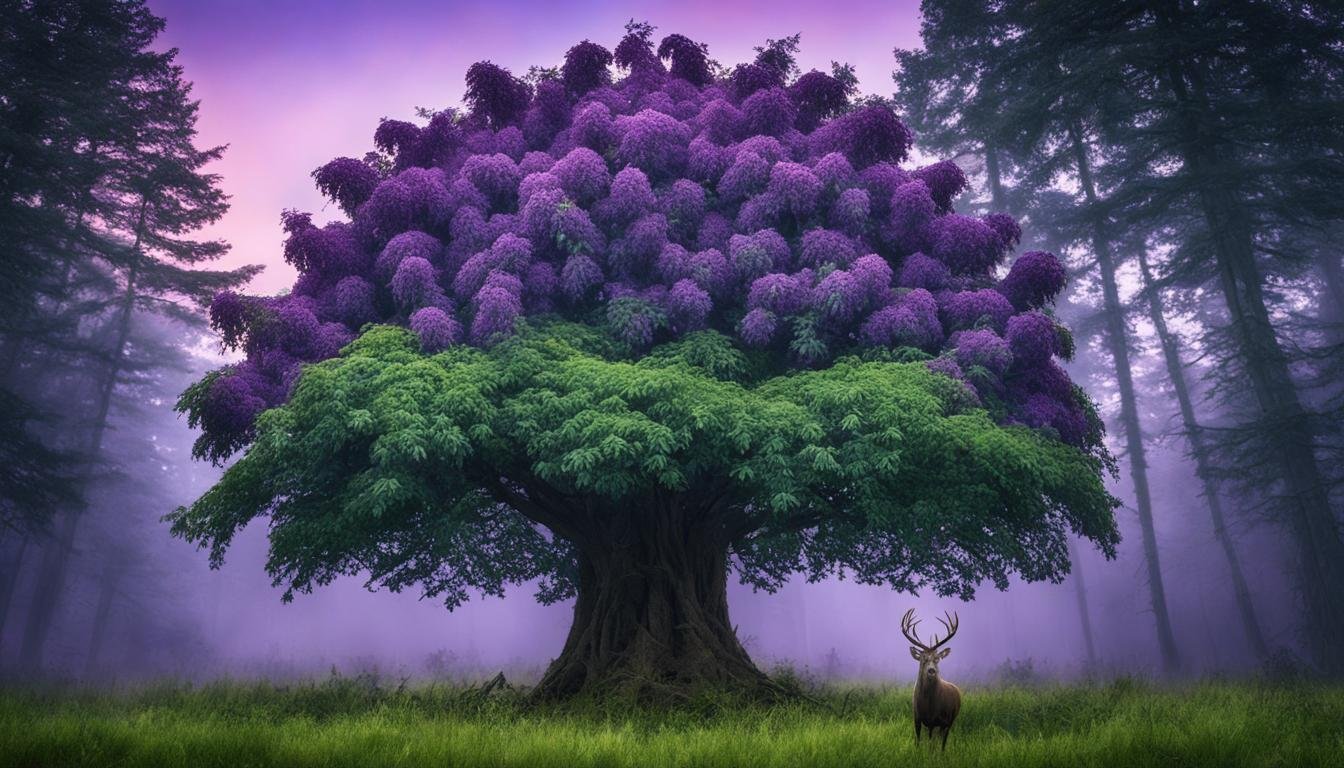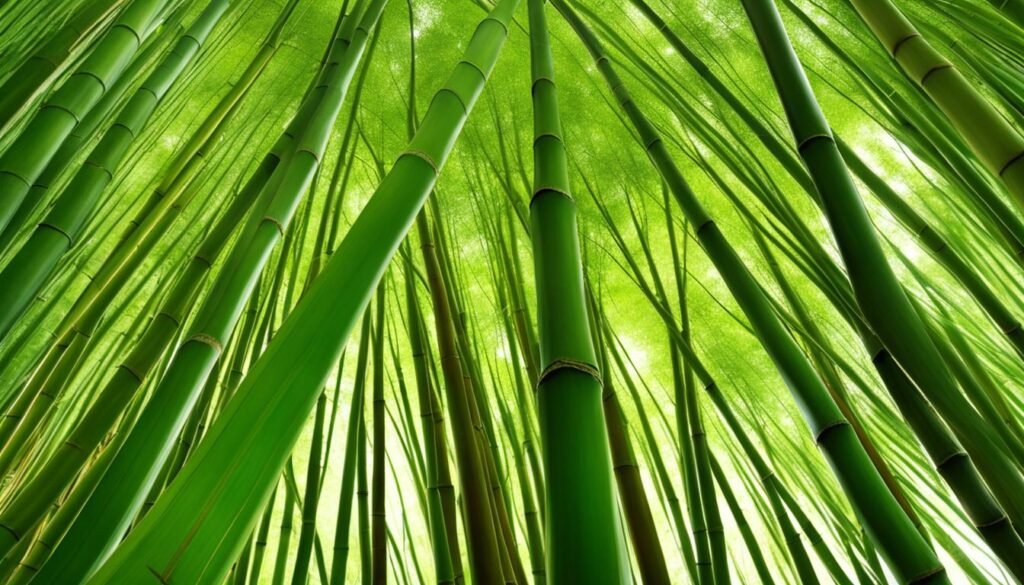Welcome to a world of enchantment, where folklore and history converge to reveal the mysteries of nature. In this article, we will embark on a captivating journey into the realm of elderberry myths and legends tales. Prepare to be mesmerized as we explore the fascinating stories that surround this beloved plant.
Key Takeaways:
- Discover the rich history and mythology behind elderberry
- Explore the diverse cultural significance of elderberry
- Learn about the medicinal uses and health benefits of elderberry
- Uncover the culinary delights of elderberry
- Understand the growing and harvesting process of elderberry
The Elder Tree – Medicine Cabinet of the Country People
The elder tree, with its multiple stems and distinctive features, is a common sight in Britain and parts of Europe. It is often found near farms and homesteads and thrives in various soil types and pH levels. The pinnate leaves and clusters of flowers and berries make it a favorite of both humans and birds. The elder tree has a long history of medicinal uses and is considered sacred in some cultures.
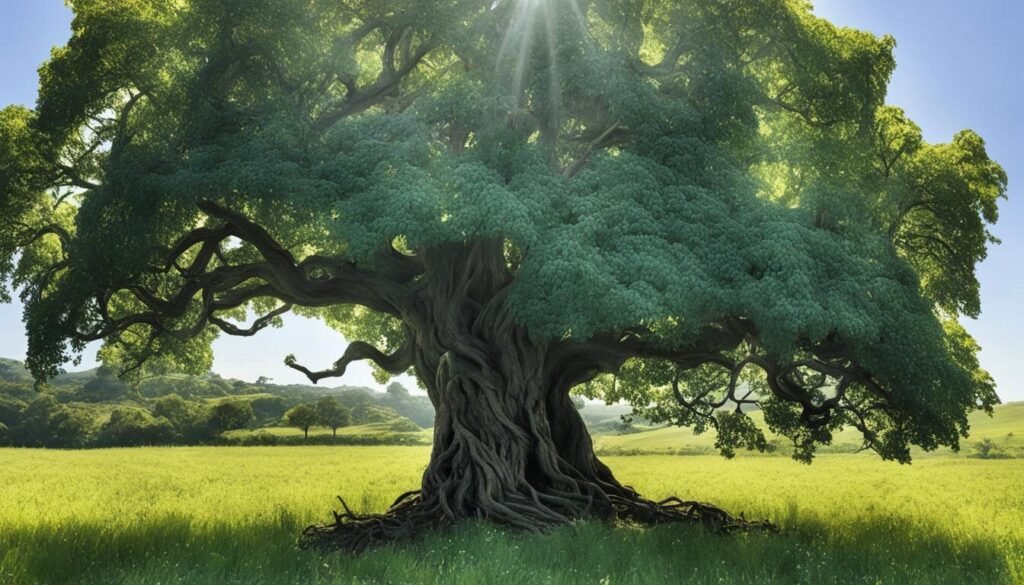
The elder tree, known scientifically as Sambucus, has been treasured by country people for centuries. Its abundance and versatility have earned it the nickname “the medicine cabinet of the country people.”
The elder tree is a treasure trove of natural remedies and has been used in traditional medicine for generations. Its bark, leaves, flowers, and berries all have unique healing properties.
Let’s take a closer look at some of the medicinal uses of the elder tree:
| Part of the Elder Tree | Medicinal Uses |
|---|---|
| Bark | Used as a diuretic, diaphoretic, and expectorant. Can help alleviate fevers, colds, and respiratory issues. |
| Leaves | Applied topically to treat bruises, wounds, and insect bites. Can also be used as a poultice to reduce swelling and inflammation. |
| Flowers | Used to make elderflower tea, which has immune-boosting properties and can help relieve cold and flu symptoms. Also utilized in skin care products for its anti-inflammatory effects. |
| Berries | Rich in antioxidants and vitamin C. Consumed as elderberry syrup or included in culinary dishes to support the immune system, promote heart health, and reduce inflammation. |
It’s important to note that while the elder tree has been used for medicinal purposes for centuries, consulting with a healthcare professional is always recommended before using any natural remedy.
History, Mythology, and Folklore of Elderberry
Elderberry has a rich history intertwined with captivating mythology and folklore. The origins of its name can be traced back to the Anglo-Saxon word for “fire,” possibly because its hollowed branches were used as blow furnaces. In ancient times, elders were revered as sacred to a vegetation Goddess, and it was believed that cutting down an elder tree would invite bad luck, possibly causing toothache. As Christian influence grew, elder trees took on new symbolism, associated with sorrow and the cross on which Jesus was crucified. Despite these changes, elderberry maintained its role as a protective plant, believed to ward off evil spirits in various rituals and traditions.
Elderberry’s historical significance represents a fascinating blend of cultural beliefs and practices, showcasing the enduring connection between humans and nature. Let’s delve deeper into the enchanting history, mythology, and folklore of elderberry.
Beliefs and Symbolism
“The elder tree, with its mystical ties to ancient goddesses and its protective nature, serves as a bridge between the human and spiritual realms.” – Your Name
Throughout history, elderberry has been associated with a range of beliefs and symbolism. In some cultures, elderberry was regarded as a guardian for homes and people, offering protection against negative energies and evil forces. The tree was often planted near entrances to ward off malevolent spirits, and elderberry branches were hung in doorways or woven into talismans for added protection.
The Elder Mother and Transformation
A common theme in elderberry mythology is the figure of the Elder Mother, a mythological being associated with the elder tree and its nurturing properties. In folklore, the Elder Mother could change shape, sometimes appearing as an old woman or a young maiden. She was believed to hold the wisdom of the forest and possess healing powers. The Elder Mother’s association with transformation reflects the regenerative nature of elderberry and its ability to provide sustenance and healing to those who seek it.
Elderberry in Ancient Rituals
The significance of elderberry extended to ancient rituals and ceremonies. The berries, flowers, and leaves of elderberry were often used in various magical practices. Elderberry branches were incorporated into ritual fires to bring about protection, purification, and fertility. The belief in elderberry’s connection to the spiritual realm influenced its role in rituals for divination, love spells, and connection with ancestral spirits.

Elderberry’s mythology and folklore continue to captivate and inspire individuals around the world. The tales associated with elderberry reveal the profound connection between nature, history, and human belief systems. As we explore the wonders of elderberry, let us immerse ourselves in its mythical legacy and embrace the wisdom it imparts.
Elderberry in Different Cultures
Elderberry has a long-standing presence in various cultures across the globe. Let’s explore how this remarkable plant is revered and utilized in different societies.
The Celtic Connection
In Europe, particularly in Celtic folklore, elderberry is associated with enchanting fairy realms. It is believed to be a protective plant that can ward off malevolent spirits and bring good fortune.
A Norse Mythological Link
In Norse mythology, the elder tree holds a significant place. It is closely linked to the Earthmother, symbolizing the cycle of life and death. According to the myth, the journey of the soul after death begins with the elder tree.
Traditional Chinese Medicine
Within traditional Chinese medicine, elderberry is highly regarded for its medicinal properties. It is recognized for its ability to expel phlegm, reduce swelling, and promote urination. Chinese culture appreciates elderberry as an herbal remedy that supports overall well-being.
Native American Wisdom
Native American tribes have long recognized the medicinal benefits of elderberry. They traditionally used elderberry to treat congestion and various skin ailments due to its antiviral and anti-inflammatory properties. The plant was considered a valuable natural remedy within their healing practices.
To visualize the cultural significance of elderberry, take a look at the following table:
| Culture | Beliefs and Uses |
|---|---|
| Celtic | Associated with fairy realms and protective qualities |
| Norse | Linked to the Earthmother and the journey of the soul after death |
| Chinese | Recognized in traditional Chinese medicine for various health benefits |
| Native American | Used for treating congestion and skin ailments |
As we delve into the diverse traditions and practices surrounding elderberry, we gain a deeper appreciation for its cultural significance and the timeless wisdom it carries.
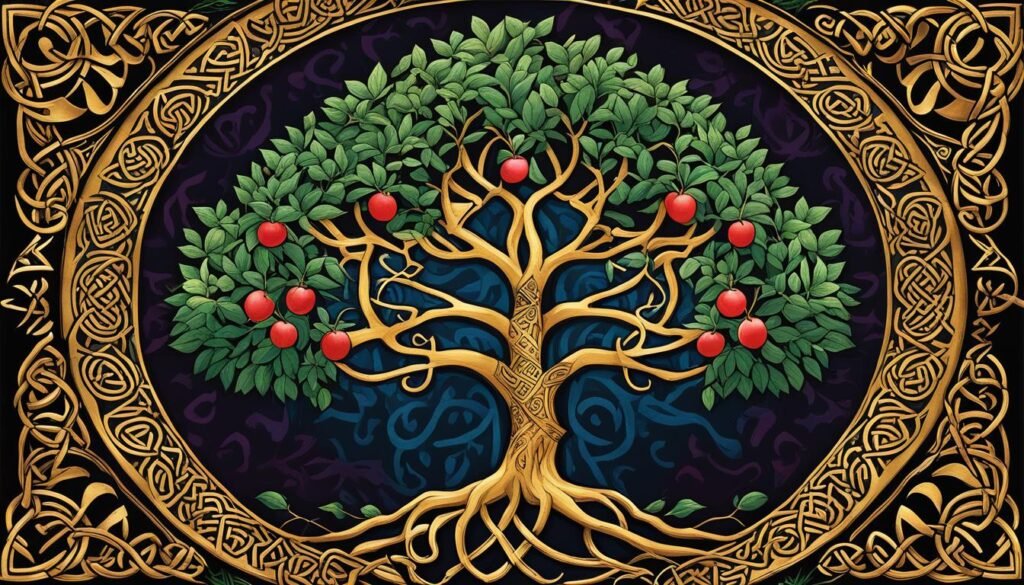
Medicinal Uses of Elderberry
Elderberry, a beloved plant with a rich history, has long been recognized for its remarkable medicinal properties. Hippocrates referred to it as a “medicine chest,” highlighting its diverse range of healing abilities. Pliny the Elder also extolled its virtues, describing its uses in both culinary and medicinal applications. Let’s delve into the fascinating world of the medicinal uses of elderberry.
Known for its high vitamin C content and antioxidant properties, elderberry has been traditionally used to treat a wide range of ailments. Its effectiveness in addressing cuts, burns, and even the dreaded plague has earned it a reputation as a powerful natural remedy.
“Elderberry, a medicine chest offering relief for various ailments.”
The immune-boosting properties of elderberry have been noted throughout history. It is revered for its ability to enhance the immune system, helping the body combat illnesses and infections. This makes elderberry a popular choice for strengthening the body’s defenses and warding off common ailments.
The Power of Vitamin C
Vitamin C plays a crucial role in supporting overall health and bolstering the immune system. Elderberry is known for its high concentration of this essential vitamin, making it an excellent natural source for fortifying the body’s defenses.
Furthermore, elderberry contains anthocyanins, powerful antioxidants that help protect cells from damage and inflammation. These compounds also play a role in enhancing the body’s production of cytokines, which are important for immune response.
The traditional medicine systems of various cultures, such as traditional Chinese medicine, have long utilized elderberry to address respiratory infections, joint pain, and other conditions.
“Elderberry, a versatile plant with a long history of medicinal uses. From cuts and burns to the plague, this remarkable herb has been a trusted ally in promoting health.”
Modern research continues to explore the potential health benefits of elderberry, shedding light on its wide-ranging medicinal uses. Scientists are uncovering the mechanisms behind elderberry’s immune-boosting effects and its potential application in treating respiratory infections and joint inflammation.
Elderberry’s medicinal properties are multifaceted, making it a versatile remedy for various health concerns. From enhancing the immune system to addressing specific ailments, elderberry remains a beloved natural healing agent.
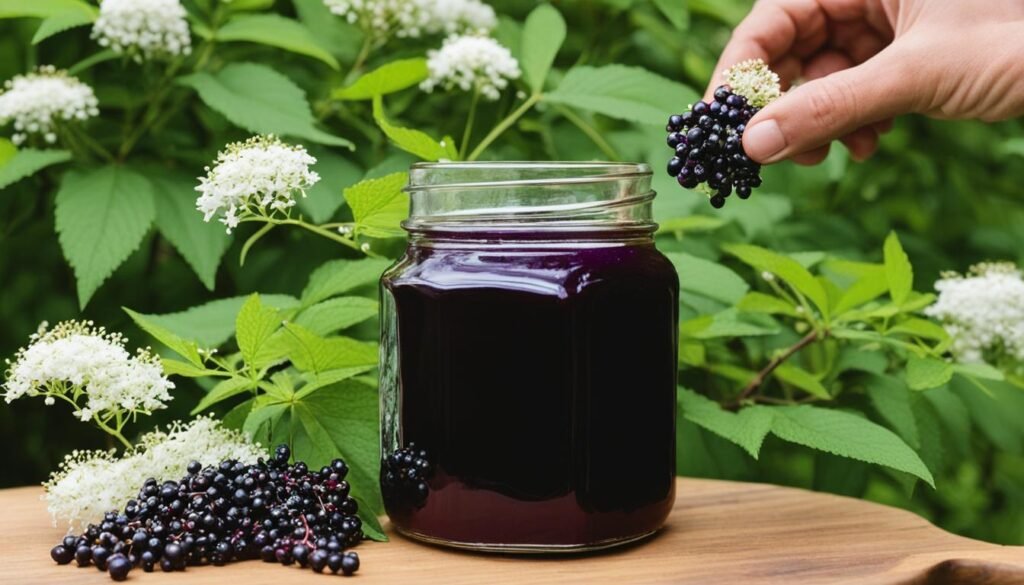
Elderberry and Immune Support
Elderberry has gained popularity for its potential immune-boosting properties, making it a go-to natural remedy for many. Rich in antioxidants, particularly anthocyanins, elderberry can help enhance the body’s production of cytokines, which are vital for a strong immune response. By promoting immune function, elderberry may help defend against common ailments, such as colds and the flu.
Some studies suggest that elderberry extract may reduce the duration and severity of cold and flu symptoms. These findings have contributed to the growing use of elderberry as a preventative treatment for respiratory infections.
While more research is needed to fully understand the extent of elderberry’s immune-supporting capabilities, its historical use and growing body of evidence have made it a popular choice among those seeking natural ways to support their immune system.
Elderberry and Cytokine Production
“Elderberry contains valuable antioxidants called anthocyanins, which can help enhance the body’s production of cytokines, proteins that play a key role in immune function and response.”
| Benefits of Elderberry for Immune Support | |
|---|---|
| 1 | Rich in antioxidants, including anthocyanins |
| 2 | Promotes cytokine production |
| 3 | May reduce the duration and severity of cold and flu symptoms |
| 4 | Popular natural remedy for respiratory infections |
While elderberry is generally considered safe for most people, it’s essential to consult with a healthcare professional before adding elderberry supplements or extracts to your routine, particularly if you have any underlying health conditions or are taking medications that may interact with it.
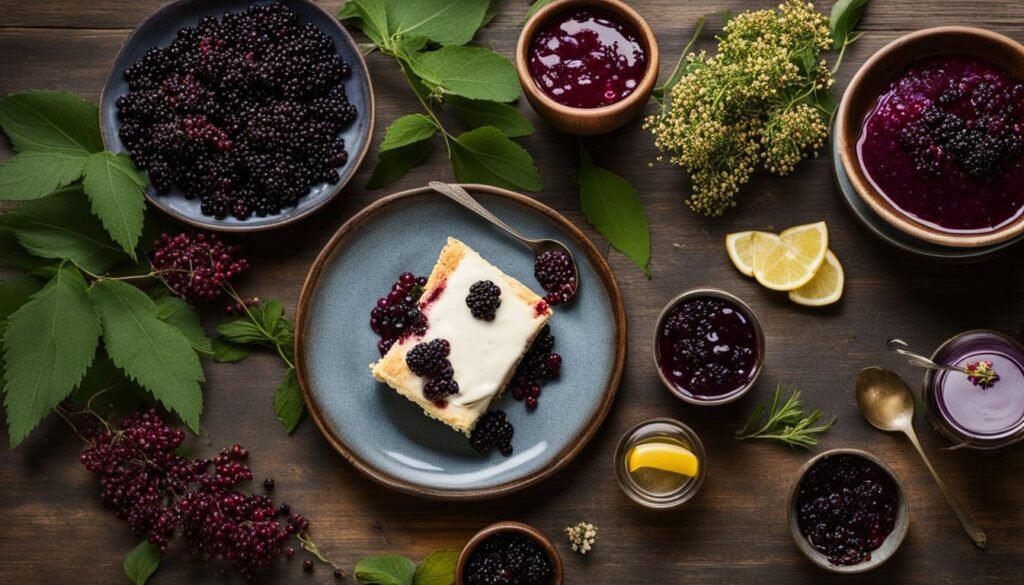
As you can see, the culinary uses of elderberry are vast and varied. Whether you’re making syrups, jams, jellies, wines, or incorporating elderflower into your cooking, elderberry adds a delicious and distinct flavor to your culinary creations.
Growing and Harvesting Elderberry
Growing elderberry is a rewarding experience that allows you to harness the power of this remarkable plant right in your own backyard. Elderberries are known for their delicious berries and versatile medicinal properties. In this section, I will guide you through the process of growing and harvesting elderberry, ensuring that you can enjoy the abundance of this incredible plant.
Creating the Ideal Growing Conditions
Elderberries thrive in well-drained, moist, loamy soil. They prefer a pH level ranging from 5.5 to 6.5, which is slightly acidic. When choosing a location for your elderberry shrubs, make sure to select an area with full sun exposure. This will promote the healthy development of the plant and maximize fruit production.
Regular watering is essential during the growing season, especially in dry periods. Adequate moisture will ensure that the elderberries grow plump and juicy, full of flavor and beneficial compounds.
Propagating and Planting Elderberry
Elderberries are shallow-rooted shrubs that can be propagated in multiple ways. One popular method is through hardwood cuttings. Simply take 12 to 18-inch cuttings from a healthy elderberry plant during the dormant season (late fall to early spring) and plant them directly into the soil. Keep the cuttings moist, and they will soon establish roots and begin to grow.
You can also propagate elderberries through seeds, although this method is less common due to the longer time it takes for the plants to mature and bear fruit.
When planting elderberry shrubs, make sure to space them about 6 to 10 feet apart to allow enough room for growth. This will also ensure proper air circulation, minimizing the risk of diseases. Ensure that the planting hole is deep enough to accommodate the root system without crowding.
Harvesting Elderberry Flowers and Berries
Elderberry flowers are typically ready for harvesting in late spring or early summer when they are fully bloomed and have a strong fragrance. Simply cut the flower clusters, making sure to leave enough stems to allow for further growth and fruiting.
The elderberry berries are ready for harvesting in late summer or early fall when they are juicy and dark purple. Harvest the berries by gently removing the clusters from the branches. Be careful not to crush or bruise the berries, as this could affect their quality.
A Visual Guide: Stages of Elderberry Growth
| Stage | Description | Image |
|---|---|---|
| Flowering Stage | The stage when elderberry begins to produce beautiful clusters of creamy white flowers. | 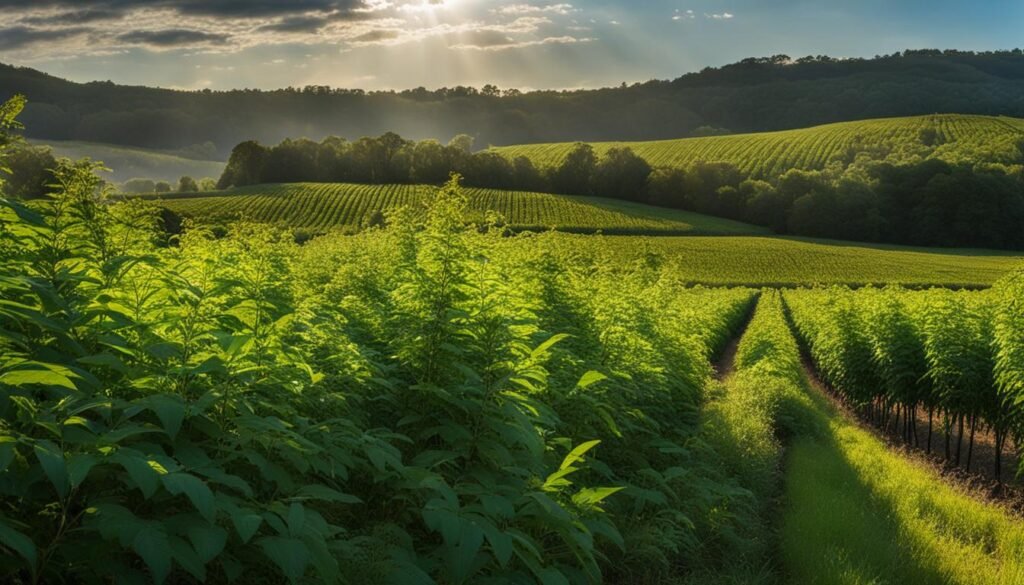 |
| Fruit Development Stage | The stage when the flowers transform into small, green berries that gradually ripen into dark purple. | 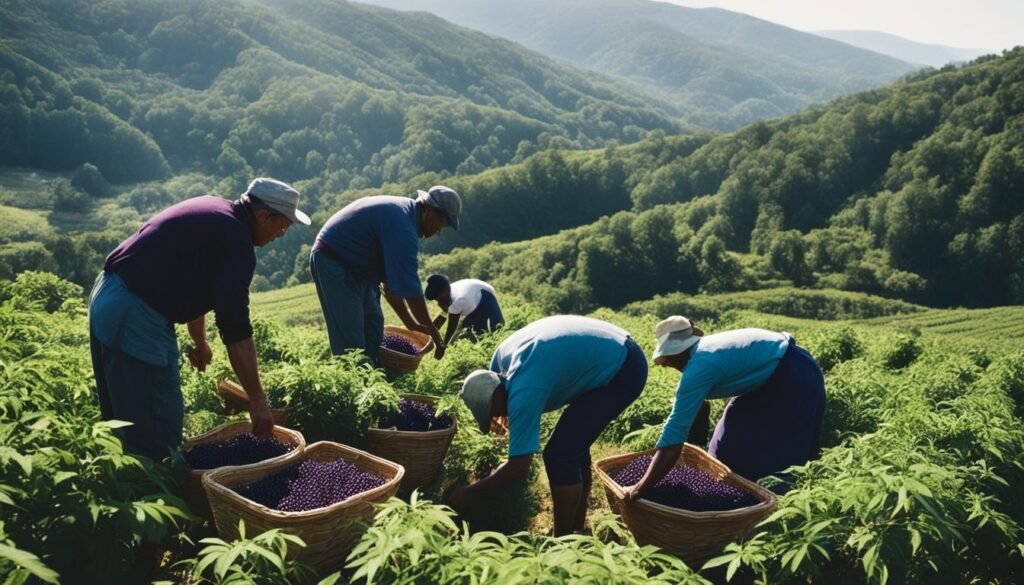 |
| Harvesting Stage | The stage when the elderberries are plump, fully ripe, and ready to be harvested and enjoyed. |  |
By following these simple guidelines, you’ll be able to grow and harvest elderberry successfully. Whether you’re looking to enjoy the delicious berries or harness their medicinal properties, growing elderberry is a delightful journey from seed to harvest.
Potential Risks and Precautions
While elderberry is generally safe for consumption, it is important to take certain precautions to ensure your well-being. Here are some potential risks and precautions to keep in mind when using elderberry:
Risks
- Fresh or unripe berries contain a small amount of cyanide and should not be consumed.
- The leaves, bark, roots, and seeds of the elderberry plant also contain some cyanide, although a large quantity would be needed for a fatal dose.
It’s important to note that cooking elderberries and flowers eliminates the presence of cyanide and makes them safe to consume.
Precautions
- Consult a healthcare professional before using elderberry for any specific conditions or concerns.
- If you have known allergies to plants in the Caprifoliaceae family (such as honeysuckle), exercise caution when using elderberry products.
- If you are pregnant, breastfeeding, or have an underlying medical condition, consult your healthcare provider before incorporating elderberry into your routine.
- Always follow recommended dosage instructions and never exceed the recommended amount.
- Keep elderberry products out of reach of children.
By being aware of these risks and taking necessary precautions, you can enjoy the benefits of elderberry safely and responsibly.
| Risks | Precautions |
|---|---|
|
|
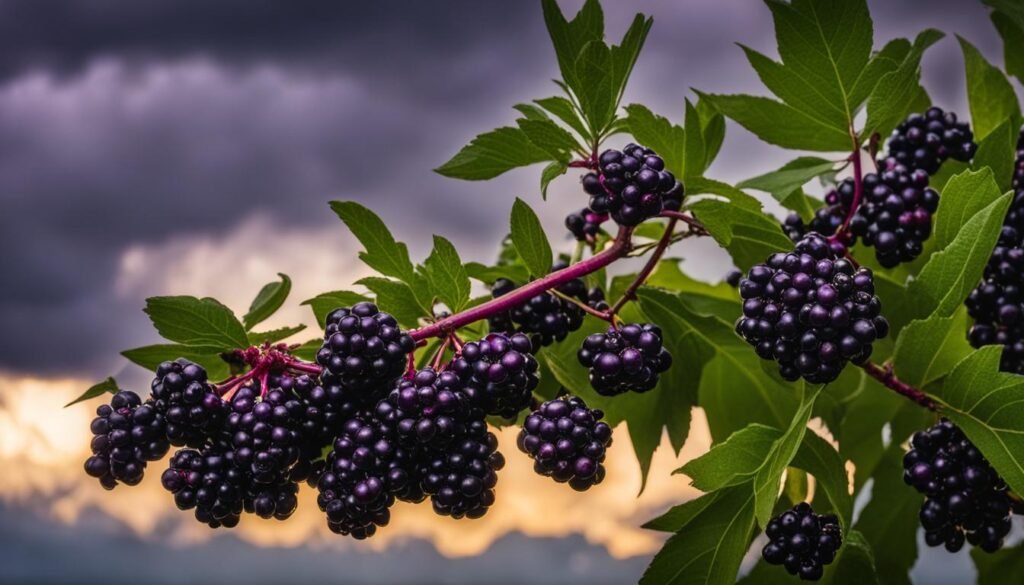
Scientific Research and Elderberry
Scientific research has shed light on the numerous health benefits of elderberry. Studies have shown that elderberry exhibits antioxidant properties, contributes to immune system enhancement, and has the potential to lower blood pressure and cholesterol levels. Ongoing research continues to investigate elderberry’s efficacy and its potential applications in modern medicine.
Elderberry’s antioxidant properties make it a valuable resource for combating oxidative stress and reducing inflammation in the body. In addition, its rich content of anthocyanins, the compounds responsible for its vibrant purple hue, have been found to support the production of cytokines—the proteins that play a vital role in immune response.
“The antioxidant and immune-boosting effects of elderberry make it an intriguing subject of research.”
Elderberry’s potential to regulate blood pressure and cholesterol levels is also under scientific investigation. Preliminary studies suggest that certain components of elderberry may help manage hypertension and reduce LDL (bad) cholesterol, contributing to cardiovascular health.
Furthermore, researchers are exploring elderberry’s possible applications in the prevention and treatment of various conditions, including viral infections such as the common cold and flu. Some studies have shown that elderberry extract may help reduce the severity and duration of these respiratory illnesses.
The Role of Elderberry in Boosting the Immune System
Elderberry’s immune-boosting effects stem from its ability to modulate immune responses, including the production of cytokines, which promote the defense mechanisms of the body. By activating and enhancing immune cells, elderberry can help strengthen the body’s natural defenses against pathogens and reduce the risk of infection.
A Closer Look at Elderberry’s Antioxidant Properties
The antioxidant properties of elderberry are attributed to its high concentration of bioactive compounds such as flavonoids and polyphenols. These compounds scavenge free radicals, which are harmful molecules that can contribute to cell damage and lead to various diseases. By neutralizing free radicals, elderberry helps protect cells from oxidative stress and supports overall health and well-being.
Elderberry’s antioxidant effects have also been linked to potential anti-aging properties, as oxidative stress is known to accelerate the aging process. Through its ability to combat oxidative stress, elderberry may contribute to healthy aging and longevity.
| Benefit | Scientific Research |
|---|---|
| Antioxidant Properties | Studies have shown that elderberry is rich in flavonoids and polyphenols, which possess potent antioxidant activity, protecting cells against oxidative stress and supporting overall health. |
| Immune System Support | Research has indicated that elderberry can enhance immune system function by promoting cytokine production and activating immune cells, helping to defend against pathogens. |
| Blood Pressure Regulation | Preliminary studies suggest that elderberry may have the potential to regulate blood pressure levels, contributing to cardiovascular health. |
| Cholesterol Management | Early research indicates that certain components of elderberry may help lower LDL cholesterol levels, potentially reducing the risk of cardiovascular disease. |
The scientific research conducted on elderberry highlights its potential as a valuable natural resource for enhancing health and well-being. As ongoing studies continue to unveil its potential applications, elderberry remains an intriguing subject for researchers, healthcare professionals, and individuals seeking natural remedies.
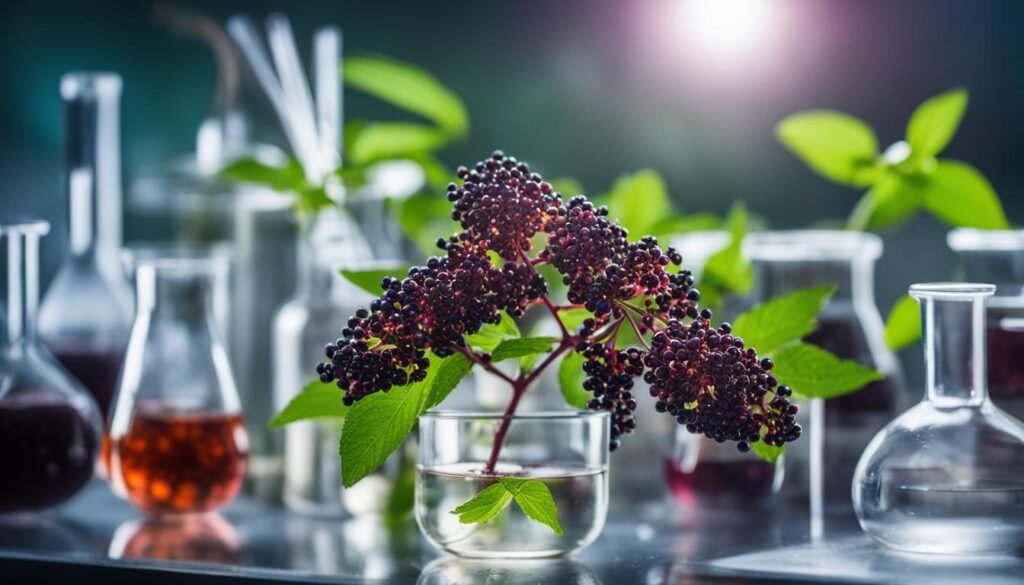
Incorporating Elderberry in Healthcare
As a journalist covering healthcare trends, I am excited to share with you the growing recognition of elderberry in the field of integrative medicine. Healthcare facilities across the United States are beginning to incorporate elderberry into their treatment programs, harnessing its immune-boosting properties and potential health benefits. This versatile plant is becoming a valuable addition to holistic practices, offering a natural remedy for certain conditions.
Elderberry, known for its rich antioxidant content and ability to boost the immune system, has caught the attention of healthcare professionals and practitioners. Its potential to support overall wellness has made it a sought-after supplement in the world of integrative medicine.
In recent years, the interest in herbal remedies and natural healing has seen a significant rise. People are increasingly seeking alternatives to conventional healthcare, exploring the potential of plant-based solutions. Elderberry, with its long-standing reputation and historical use as a medicinal herb, has emerged as a promising option in this journey towards holistic well-being.
Integrative medicine, which combines conventional medical practices with alternative therapies, is embracing the power of elderberry. As more scientific studies shed light on its effectiveness, healthcare providers are incorporating it into treatment plans to complement traditional approaches.
The Benefits of Elderberry in Integrative Healthcare
Elderberry offers several benefits that make it a valuable asset in healthcare:
- Immune Support: Elderberry’s immune-boosting properties can help strengthen the body’s natural defense mechanisms, potentially reducing the likelihood and severity of illnesses.
- Antioxidant Protection: Rich in anthocyanins, elderberry acts as a potent antioxidant, protecting the body against oxidative stress and promoting overall well-being.
- Anti-inflammatory Effects: Some research suggests that elderberry may have anti-inflammatory properties, potentially aiding in the management of certain inflammatory conditions.
- Vitamin and Mineral Content: Elderberry is a natural source of vitamins, minerals, and phytonutrients that contribute to overall health and vitality.
The integration of elderberry into healthcare practices aligns with the growing emphasis on preventive care and holistic approaches to well-being. By incorporating elderberry into treatment plans, healthcare providers aim to promote a more comprehensive and patient-centered approach to healthcare.
The integration of elderberry into healthcare practices aligns with the growing emphasis on preventive care and holistic approaches to well-being.
It is important to note that while elderberry shows promise in integrative medicine, it should not replace traditional medical treatments or be seen as a cure-all. As with any health-related decision, it is crucial to consult with a healthcare professional before incorporating elderberry or any other supplement into your healthcare regimen.
As the field of integrative medicine continues to evolve, elderberry is poised to play an increasingly significant role in healthcare. Its natural properties and potential health benefits make it an appealing choice for those seeking alternative options. By embracing the power of elderberry, healthcare providers can provide patients with a more comprehensive and holistic approach to their well-being.
Let us now explore the intersection of elderberry and skincare in the next section.

Elderberry’s enchanting legacy extends to its culinary uses as well. The berries are prized for their rich flavor and vibrant color, making them a popular ingredient in jams, jellies, syrups, and wines. Elderberry infusions are also used to add a unique twist to cocktails and desserts.
To fully appreciate the enchantment of elderberry, let’s take a closer look at its remarkable qualities:
“Elderberry is a plant of many wonders, from its mythical associations to its medicinal and culinary uses. Its enchanting legacy continues to captivate and inspire, reminding us of the beauty and power of nature.”
Medicinal Properties of Elderberry
Elderberry has been valued for centuries for its medicinal properties. It is rich in antioxidants, flavonoids, and vitamins that support overall health and boost the immune system. Scientific studies have shown that elderberry may help reduce the duration and severity of cold and flu symptoms, and even aid in the prevention of respiratory infections.
Culinary Delights with Elderberry
Elderberry’s unique flavor profile makes it a versatile ingredient in the culinary world. The berries can be transformed into delicious jams, jellies, and syrups, adding a delightful sweetness to various dishes. Elderberry wines are also highly sought after for their complex flavors. Additionally, elderflower, the blossoms of the elderberry tree, are used to infuse desserts, teas, and cocktails with a distinct floral note.
Elderberry in History and Culture
Elderberry has played a significant role in history and culture, with mentions dating back to ancient civilizations. It has been associated with folklore, mythology, and traditional medicine, showcasing its enduring legacy in the human imagination. From protecting against evil spirits to symbolizing wisdom and regeneration, elderberry holds a special place in the hearts of people around the world.
The Enchanting Legacy of Elderberry
| Aspect | Description |
|---|---|
| Folklore | Elderberry’s associations with fairy realms and magical powers |
| Medicinal Uses | Elderberry’s healing properties and potential health benefits |
| Culinary Uses | Elderberry’s versatile applications in jams, wines, and desserts |
| Historical Significance | Elderberry’s role in ancient civilizations and cultural symbolism |
Elderberry’s enchanting legacy continues to thrive, captivating us with its mythical tales, medicinal properties, and culinary delights. As we explore the world of elderberry, we discover the enduring enchantment that this remarkable plant holds.
Exploring Elderberry Myths and Legends Tales
The world of elderberry myths and legends tales is a treasure trove of captivating stories and folklore from different cultures. These tales have been passed down through generations, reflecting the reverence and importance of elderberry in various societies. Let me take you on a journey through the magical and mysterious world of elderberry legends and folklore.
One popular elderberry tale comes from Celtic folklore, where it is believed that elderberry bushes are gateways to fairy realms. According to the legends, fairies are drawn to the sweet aroma of elderberry flowers and often use them to create enchanted potions. These tales have inspired many artists and writers, capturing the imagination of those who believe in the mystical powers of elderberry.
“In the ancient woods, whispers carried on the wind speak of elderberry trees that weep with joy, their branches reaching toward the heavens. These tears, it is said, hold the secrets of the earth and the spirits that dwell within.”
In Norse mythology, elderberry is associated with the Earthmother, who nurtures and protects all life. It is believed that the souls of the departed find solace and guidance in the branches of the elder tree before continuing their journey to the afterlife. The ancient Norse people revered elderberry for its connection to the cycle of life and death.
Elderberry also holds a significant place in Native American folklore. Many tribes believe that elderberry possesses powerful healing properties and can ward off evil spirits. The Cherokee people, for example, tell stories of an elderberry spirit that protects the tribe from harm and brings good fortune.
Elderberry Stories and Myths
Throughout history, elderberry has been associated with various tales and myths, each highlighting its unique qualities and significance. In Greek mythology, elderberry is linked to the goddess Persephone and her journey through the underworld. It is said that the berries of the elder tree represent the tears shed by Persephone during her time in the realm of the dead.
In Scandinavian folklore, elderberry is believed to have protective properties. It is often planted near homes and barns to ward off evil spirits and protect the inhabitants from harm. Some tales even suggest that placing elderberry branches above doorways can keep witches and other malevolent beings at bay.
The Legend of the Elder Tree
One of the most well-known elderberry legends tells the story of the Elder Mother. According to this ancient tale, an old woman named Frau Holle resides within the elder tree. She is the guardian of the earth’s fertility and ensures a bountiful harvest each year. To honor her, people would leave offerings near elder trees, seeking her blessings for their crops and livestock.
As the sun sets and the moon rises, the elder tree comes alive with whispered tales and ancient wisdom. Its gnarled branches hold the secrets of generations past and the hopes and dreams of those who listen. Elderberry has become more than just a plant – it is a conduit to our collective imagination and the enchanting world of myths and legends.
Join me as we venture deeper into the realm of elderberry stories, uncovering the fascinating folklore and enduring legacy of this remarkable plant.

Elderberry Legends and Folklore from Around the World
| Region/Culture | Elderberry Legend |
|---|---|
| Celtic | The Gateway to Fairy Realms |
| Norse | The Earthmother and the Journey of the Soul |
| Native American | The Protector from Evil Spirits |
| Greek | Persephone’s Tears |
| Scandinavian | Warding off Evil Spirits |
| European | The Legend of the Elder Mother |
Conclusion
Elderberry is not just a plant; it holds a cherished place in our folklore, history, and traditional medicine. Throughout the ages, elderberry has captivated our imagination with its enchanting myths and legends tales, weaving stories of magic, protection, and healing. These tales remind us of the deep connection between humans and nature, highlighting the power and beauty that can be found in the natural world.
As we delve deeper into the wonders of elderberry, we unlock the secrets hidden in its branches and berries. Its rich history and cultural significance unveil a legacy that spans across cultures and continents. From ancient rituals and sacred folklore to its integration in modern healthcare and skincare, elderberry continues to inspire generations with its versatile culinary uses and potential health benefits.
Let us not forget the wisdom embedded in elderberry’s tales. As we explore its mythical lore, we awaken a profound appreciation for the bountiful gifts of nature. Elderberry serves as a reminder of the interconnectedness between humans and the natural world, offering us a glimpse into the rich tapestry of stories that shape our collective consciousness. So, let us listen to the whispers of elderberry’s legends, embracing the wisdom they hold, and continuing to celebrate the enduring magic of this remarkable plant.
FAQ
What is the significance of elderberry in mythology and folklore?
Elderberry has a rich history and is steeped in mythology and folklore. It has been associated with sacredness, protection against evil spirits, and various rituals and traditions throughout different cultures.
What are the medicinal uses of elderberry?
Elderberry has been used to treat a wide range of ailments, from cuts and burns to fever and the plague. It is known for its high vitamin C content, antioxidant properties, and immune-boosting effects. In traditional Chinese medicine, it is used to treat respiratory infections and joint pain.
Can elderberry help boost the immune system?
Yes, elderberry is often touted for its immune-boosting properties. It is rich in antioxidants, including anthocyanins, which can enhance the body’s production of cytokines and promote immune response. Some studies suggest that elderberry extract can reduce the duration and severity of cold and flu symptoms.
How can elderberry be used in cooking?
Elderberry berries are commonly used to make syrups, jams, jellies, and wines. The flowers can be cooked into pancakes or used to make beverages. Elderberry is versatile and can be used as an ingredient in various recipes.
How do I grow and harvest elderberry?
Elderberry is relatively easy to grow, preferring well-drained, moist, loamy soil. It requires regular watering, especially during the growing season. Elderberries can self-sow and propagate easily through cuttings. Harvesting of elderberry flowers and berries should be done at the right time for optimal flavor and medicinal properties.
Are there any risks or precautions associated with elderberry?
While elderberry is generally safe for consumption, it’s important to note that fresh or unripe berries contain a small amount of cyanide and should not be consumed. The leaves, bark, roots, and seeds also contain some cyanide, but it would require a large quantity for a fatal dose. It’s always advisable to consult a healthcare professional before using elderberry for any specific conditions or concerns.
What does scientific research say about elderberry?
Scientific research has shown promising results regarding the health benefits of elderberry. It has demonstrated antioxidant properties, immune-boosting effects, and potential effects on blood pressure and cholesterol. Ongoing research aims to further explore elderberry’s efficacy and potential applications in modern medicine.
How is elderberry incorporated in healthcare practices?
Some healthcare facilities are beginning to integrate elderberry into their treatment programs. Its immune-boosting properties and potential health benefits make it a valuable addition to integrative medicine practices.
Can elderberry be used in skincare products?
Yes, elderberry’s antioxidant and antimicrobial properties have led to its use in skincare products. It is believed to have benefits for skin health, such as reducing inflammation, promoting collagen production, and providing protection against environmental stressors.
What is the enchanting legacy of elderberry?
The myths, legends, and traditional uses of elderberry have left an enduring legacy. From its associations with ancient goddesses to its role as a medicine chest, elderberry continues to captivate and inspire. Its culinary uses and potential health benefits ensure that its enchantment will endure.
Where can I find more information about elderberry myths and legends tales?
For more detailed information and captivating stories about elderberry myths and legends tales, you can explore folklore books, cultural resources, and online platforms dedicated to mythology and folklore.
